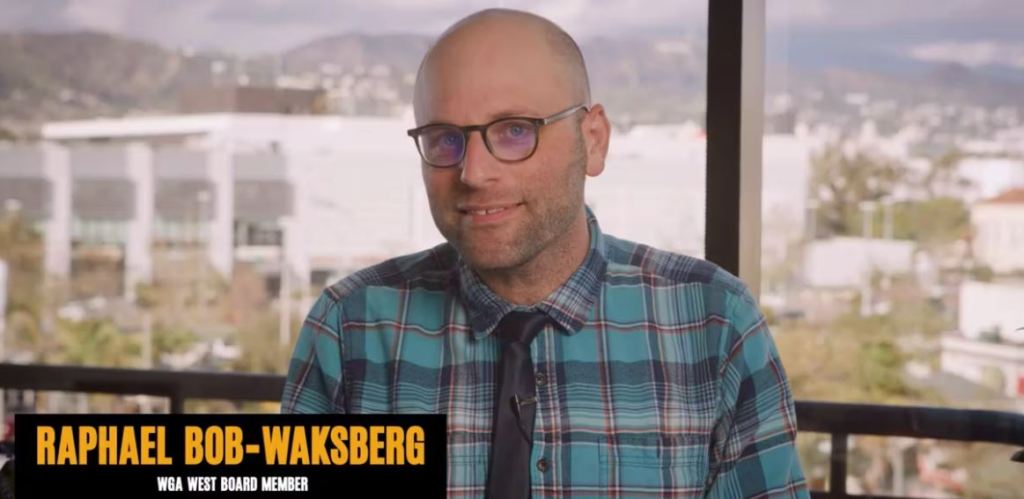
WGA Board Member Raphael Bob-Waksberg Says Strike “Not A Guaranteed Outcome” Of Ongoing Contract Talks But Urges Members To Recall Gains Made In Past Showdowns
April 25, 2023The Writers Guild of America doesn’t want to strike, but it will if it has to. That’s the thrust of the guild’s latest video featuring WGA West board member and BoJack Horseman creator Raphael Bob-Waksberg discussing the history of gains the guild has made by standing firm at the bargaining table – and by going on strike if all else fails.
“I want to be very clear,” he says in the video posted the WGA website Tuesday. “A strike is not a guaranteed outcome for this year’s negotiation. And we do not want one. What we want is to be paid fairly for creating a product that earns massive profits for the companies. And we want protections that allow us to build a stable career and a stable life.”
Related Story
WGA Members Vote Overwhelmingly To Authorize A Strike If No Deal By May 1
The studios, he said, “would love to paint us as irrational for wanting these most basic of things. They would love for us to forget the gains we make when we stand up together, and to instead fret over what standing up might cost us. The better question to ask is: What does it cost us when we don’t?”
The WGA is now in the final week of negotiations with the Alliance of Motion Picture and Television Producers before the May 1 expiration of their current contract.
“In a difficult negotiation, with a powerful group of companies, you don’t win gains by playing nice, or knowing the right people, or with an extra firm handshake,” Bob-Waksberg says. “No. What you’re able to win is directly tied to how much leverage you have. And just like when you’re negotiating your individual contract as a writer, our leverage as a union depends on our willingness to walk away from a bad deal. “
“We’d love it if the studios met our reasonable demands, agreed to a fair deal, and we could all keep doing what we do best: making art,” he said, but noted that “it’s our willingness to use our collective power as guild members that has won gains for writers time and time again. Strikes got us our residuals. Strikes got us our pension and health funds. And when I say, ‘got them,’ I mean we didn’t have them because the studios didn’t want to give us them, so writers were forced to withhold their labor and go on strike to get them.”
See the full video here.
Referencing the WGA’s 100-day strike of 2007-08, he said: “Some would have you believe that the strike was a failure, a vague and fruitless campaign to win DVD residuals, or whatever. The truth is, through that strike, the WGA won jurisdiction over the Internet, or what we now call streaming.”
In 2007, he said, “the studios were putting our work online. They were streaming full episodes of television, with ads. They were selling episodes and movies on iTunes. They were profiting off our work on the Internet. The position of our union at the time was, ‘You should pay us for that.’ And the position of the studios was, ‘No.’ Now try to imagine where we’d be if we had just accepted that ‘No.’”
“Think about what TV and film on the internet looks like now – try to hold it all in your head, every streaming show and movie,” he said, rattling off dozens of popular shows and movies. “Imagine if every one of these were made without WGA coverage. Half of all employment for current series writers is in streaming. Entire writing careers, the vast majority of my career, and I bet a good chunk of yours. Imagine if none of it was automatically protected under a guild contract. Imagine all of that work done without WGA-guaranteed minimums, residuals or contributions to our pension and health fund.
“Residuals from made-for-streaming projects, as a category, is the single fastest growing kind the guild collects. Residuals we got in the strike and have improved upon every three years since then, added up to $78 million in 2022. But before the strike, the studios were offering zero.
“Imagine what life would be like for writers today if writers back then hadn’t walked away from that bad deal. But they did. Writers stopped working for a little over three months and secured a future for writers like me. And because of our fight, SAG-AFTRA and DGA were able to get coverage of streaming for their members, as well.
“In that action, we showed our strength. And ten years later, we did it again. In the 2017 negotiations, the studios wanted to gut the guild’s health fund, cutting $10 million in the first year alone. This would have resulted in major cuts in benefits – guild members being kicked off their health plans, and across-the-board reductions in our salaries to pay for the difference. This was not a hypothetical worst-case scenario. This was their best and final offer as the contract deadline approached.
“So how did we stop them? Through sound, moral reasoning and appeals to their better angels? No. We stopped them by reminding them of our power. We took a strike authorization vote in which we again showed the strength of our solidarity by voting ‘Yes’ in 96% of ballots cast.
“With our credible threat of a strike, we were able to get back in the room, protect our health plan, and establish a standard of span protection in our MBA – another significant win which they did not want to give us, all without having to go on strike.”
Earlier this month, WGA members voted 97.85% in favor of authorizing a strike if their leaders can’t reach a fair deal at the bargaining table.
Must Read Stories
Actor, Calypso Singer And Civil Rights Icon Dies At 96: Photo Gallery & Obituary
Warner Bros Day: ‘Dune 2’, ‘Barbie’, ‘Wonka’ & DC Pics; Zaslav Reassures Theater Owners
Late-Night Weighs In On Tucker Carlson & Don Lemon Exits; Nets’ Stocks Dip; More Reactions
‘The Lion King’ Takes Throne In ‘Phantom’-less Broadway; Newcomers Strong
Read More About:
Source: Read Full Article






